
- Home
- India
- World
- Premium
- THE FEDERAL SPECIAL
- Analysis
- States
- Perspective
- Videos
- Sports
- Education
- Entertainment
- Elections
- Features
- Health
- Business
- Series
- In memoriam: Sheikh Mujibur Rahman
- Bishnoi's Men
- NEET TANGLE
- Economy Series
- Earth Day
- Kashmir’s Frozen Turbulence
- India@75
- The legend of Ramjanmabhoomi
- Liberalisation@30
- How to tame a dragon
- Celebrating biodiversity
- Farm Matters
- 50 days of solitude
- Bringing Migrants Home
- Budget 2020
- Jharkhand Votes
- The Federal Investigates
- The Federal Impact
- Vanishing Sand
- Gandhi @ 150
- Andhra Today
- Field report
- Operation Gulmarg
- Pandemic @1 Mn in India
- The Federal Year-End
- The Zero Year
- Science
- Brand studio
- Newsletter
- Elections 2024
- Events
- Home
- IndiaIndia
- World
- Analysis
- StatesStates
- PerspectivePerspective
- VideosVideos
- Sports
- Education
- Entertainment
- ElectionsElections
- Features
- Health
- BusinessBusiness
- Premium
- Loading...
Premium - Events
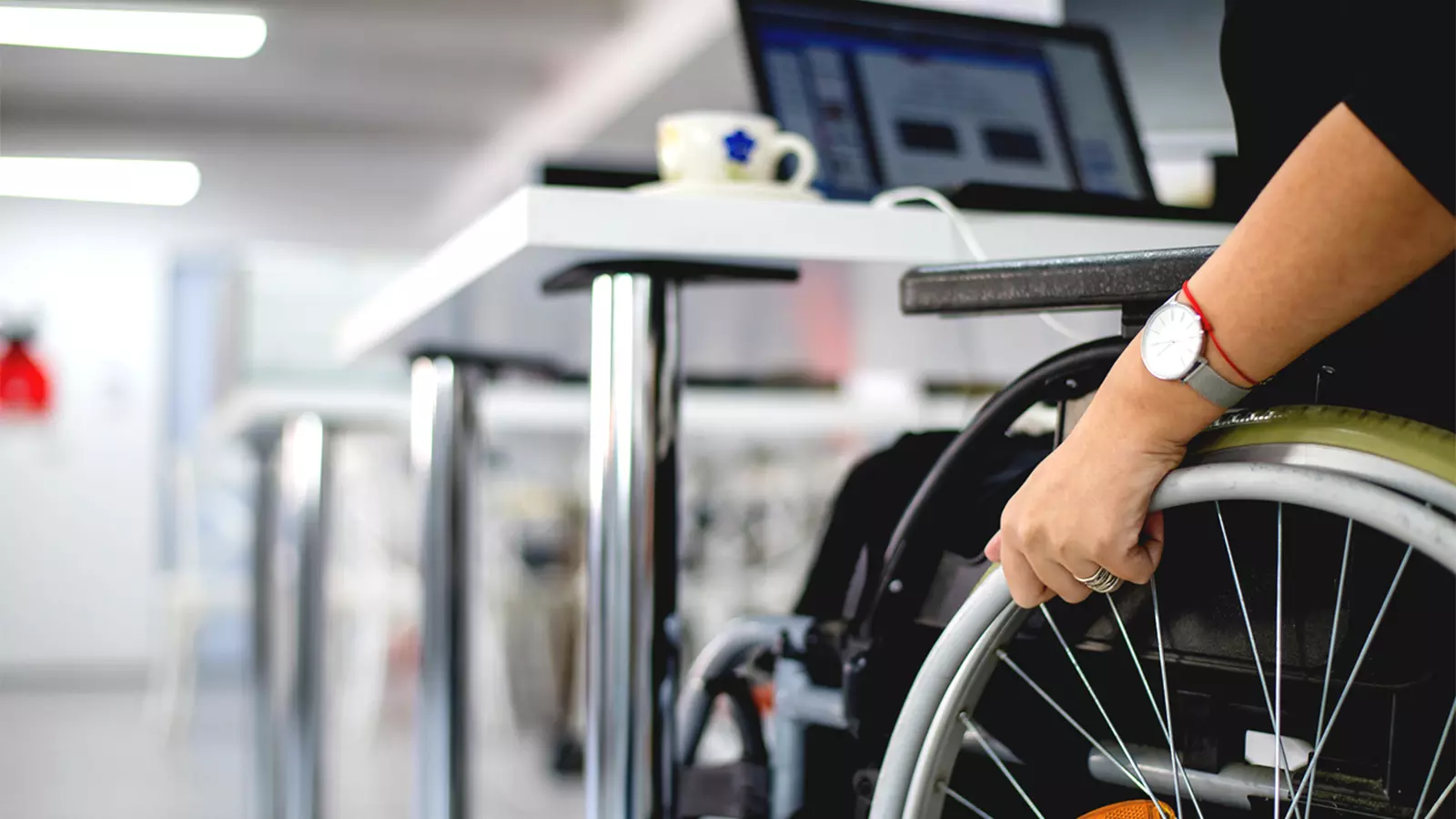
Chennai-based disabled rights activist Rajiv Rajan was overwhelmed while working on the initial draft of “the political manifesto for persons with disabilities”. “There were so many issues related to disabled people. It was difficult to prioritise one over another,” said Rajan, executive director, Ektha, an NGO, which works for people with developmental and multiple...
Chennai-based disabled rights activist Rajiv Rajan was overwhelmed while working on the initial draft of “the political manifesto for persons with disabilities”. “There were so many issues related to disabled people. It was difficult to prioritise one over another,” said Rajan, executive director, Ektha, an NGO, which works for people with developmental and multiple disabilities.
The 50-year-old, who uses a wheelchair, added that the focus was to be short and precise. “As nobody wants to read a long document.”
The manifesto, a first-of-its-kind initiative in the country, was unveiled on February 29 in New Delhi ahead of the 2024 Lok Sabha elections to be held soon.
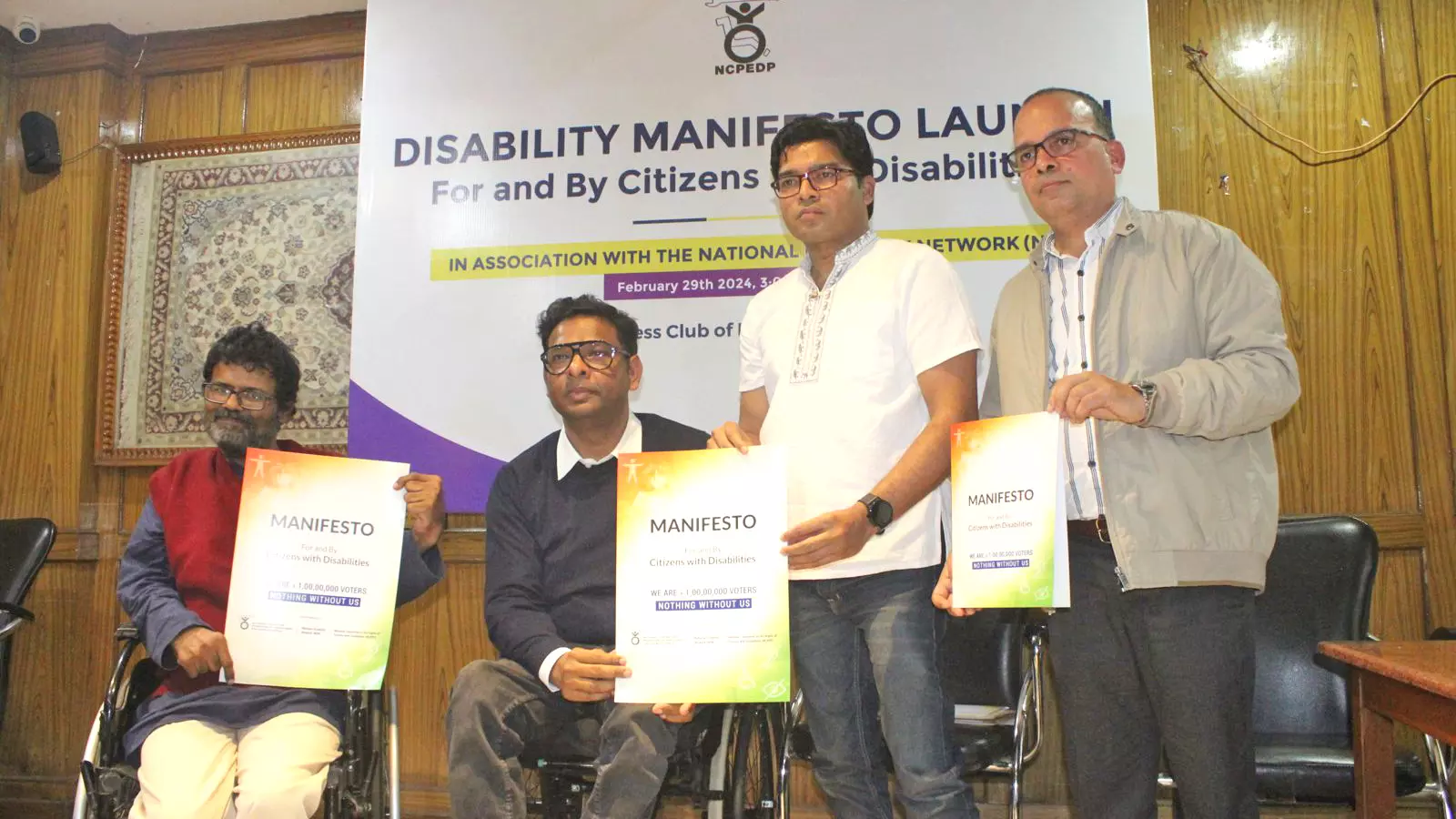
The manifesto, a first-of-its-kind initiative in the country, was unveiled on Thursday in New Delhi.
The idea of releasing the document is to make the voices of 10 million registered disabled voters (as per the Election Commission or ECI) heard by political parties ahead of the polls. It is the ongoing struggle for inclusion in the country which has one of the largest populations of disabled people in the world.
The framers of the policy statement urge political parties to prioritise the rights and needs of persons with disabilities. The manifesto highlights the challenges disabled people face and demands a more inclusive and equitable society, where every citizen can actively participate and contribute to nation building.
A manifesto for millions
It is an initiative by disability rights groups, which include the National Centre for Promotion of Employment for Disabled People (NCPEDP) in collaboration with the National Disability Network (NDN) and the National Committee on Rights of Persons with Disabilities (NCRPD).
The document titled—Manifesto For and By Citizens with Disabilities—took at least 10 months to be formulated. Several rounds of regional and national consultations took place where the inputs of at least 10,000 people (with or without disabilities) were considered before the draft was finalised. It has 10 key demands to end the “invisibility” of disabled people from the socio-political-economic discourse.
It was a daunting task for sure to encapsulate all the demands of India’s disabled population—26.8 million (as per the 2011 census)—which is one of the most marginalised sections of society.
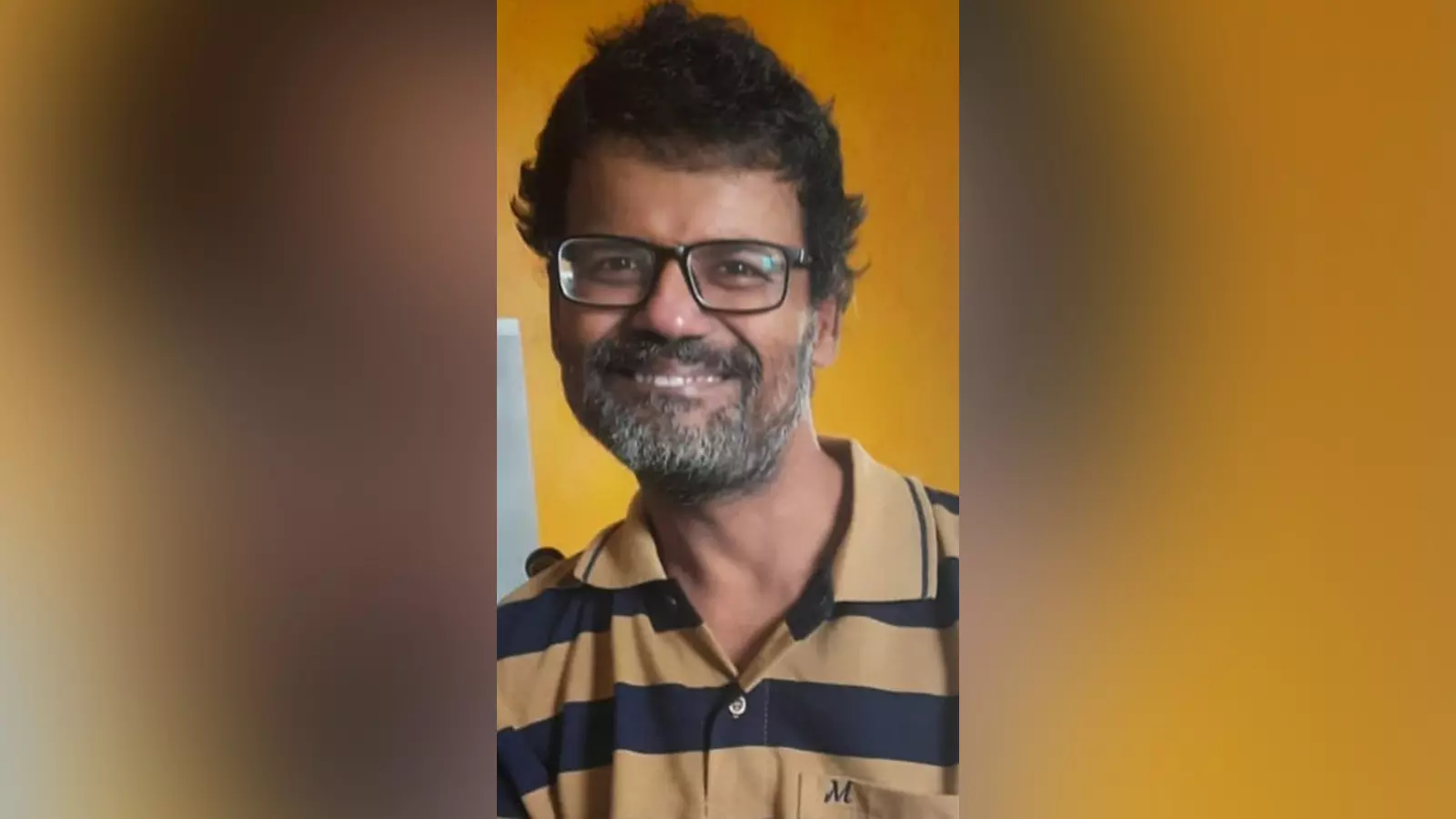
Chennai-based disabled rights activist Rajiv Rajan.
“It’s worth the effort. We also received overwhelming support and responses from various stakeholders,” said Rajan, who has cerebral palsy, a neurological condition that affects movement and muscle coordination.
Rama Krishnamachari, director of Diversity and Equal Opportunity Centre (DEOC), Bengaluru lauded the effort. “It is an important step to release the disability manifesto as it mentions what the community members want from the political establishment. It is the time when the political parties are drafting their manifestos before the polls,” Krishnamachari said.
“So rather than political parties coming up with their promises for disabled people, the community itself has presented its demands and requirements. It also serves as a reminder for political parties to take into account the needs of people with disabilities. The manifesto establishes that disabled people exist. They don’t want to be invisible anymore. So, political parties which make promises to include the disabled population in the development agenda will get votes from them and their family and friends,” she added.
More than being mere voters
“It is essential that the voices of persons with disabilities are heard in the discussions around the 2024 General Elections. This is not only because they represent a sizable vote bank but, more importantly, because they are a large consumer of goods and services and thus contributors to socio-economic development and the GDP (gross domestic product),” said Arman Ali, executive director of the NCPEDP.
The manifesto underscores the need to bring people with disabilities into the mainstream by the political parties. This could be achieved if political parties have a five-year action plan to showcase as they go and ask for votes.
“It’s high time we move beyond disability-specific concerns. Employment, accessibility and education are non-negotiable, but we must also engage with mainstream issues. Only by becoming a unified voice can we hope to be truly heard.
“We urge the political parties to not only have a specific section on persons with disabilities in their manifestos but include disability-specific concerns in all schemes and policies announced by them,” Ali, who uses a wheelchair, added.
The 21 disabilities under the Rights of Persons with Disabilities (RPWD) Act, 2016 are: blindness, low-vision, leprosy-cured persons, hearing impairment (deaf and hard of hearing), locomotor disability, dwarfism, intellectual disability, mental illness, autism spectrum disorder, cerebral palsy, muscular dystrophy, chronic neurological conditions, specific learning disabilities, multiple sclerosis, speech and language disability, thalassemia, haemophilia, sickle cell disease, multiple disabilities, acid attack victim and Parkinson's disease.
The 10 demands: Will politicians listen?
The 10 main demands raised in the document are:
1. Five per cent budgetary allocation for various programmes for disabled population,
2. affordable and accessible health insurance policies for all persons with disabilities,
3. accessible and inclusive public and private buildings, products, services, public transportation facilities and communication systems,
4. pension of Rs 5,000 per month for all community members,
5. for socio-political inclusion, amendment of Article 15 of the Constitution of India to include the word disability, five per cent reservation at all levels of governance for community members and appointment of persons with disabilities in the Rajya Sabha,
6. access to work for disabled people in small, medium and large scale enterprises,
7. a national mission on climate change for vulnerable communities, including people with disabilities,
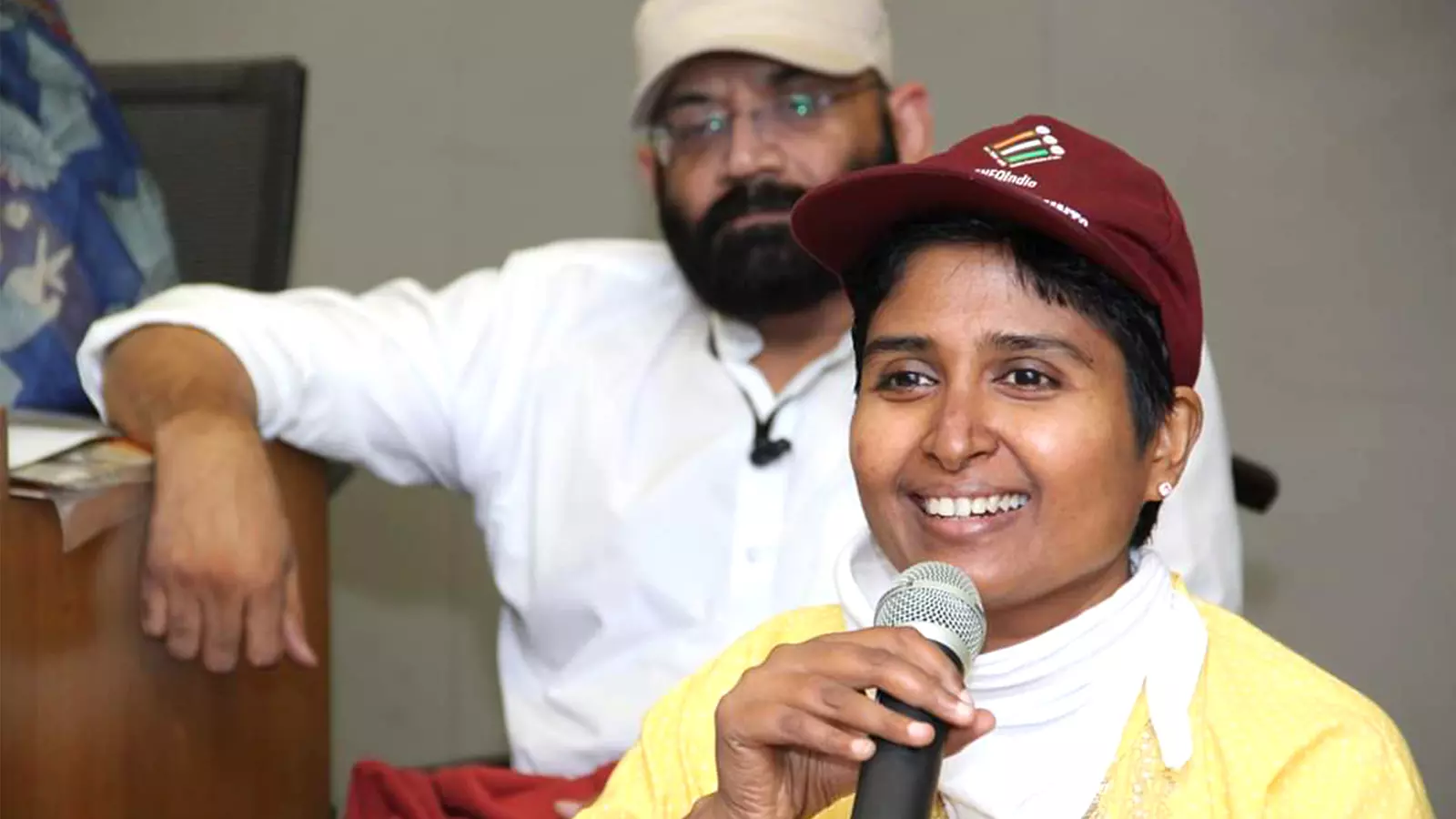
Disabled rights activist Smitha Sadasivan speaking at an event.
8. provide digital literacy and smartphone access for girls with disabilities upon completing secondary education/matriculation,
9. accessible and inclusive sports infrastructure for para athletes and
10. enhance enrollment of children with disabilities, targeting a parity with the national average by 2029.
“I expect the political class to recognise us as a stakeholder in every election. The politicians must honour our demands and include disability manifesto in their general manifesto. We are not talking about a small population. If we include senior citizens as the beneficiaries, we are talking about 30 per cent of a given population,” said Rajan.
Krishnamachari said that the political parties usually make a cursory mention of the community in their plans and programmes. “There is never any specific mention and it is usually charitable in approach. The political parties don’t consider disabled people as a vote bank, thinking they are a small group. This is not true as family and friends of disabled people are part of the community,” she added.
To establish her point the director of DEOC said that she is not a disabled person. “I work in the disability sector and my mother has a disability She uses a wheelchair. My vote will go to a party that prioritises the group. I want political parties to make specific promises and fulfil them. If the ruling class considers the issues of disabled people, it will help in the progress of the country,” she added.
Rajan said that politicians don't care about persons with disabilities. “Giving us new epithets is not caring. We need to be brought into the discussion table. We want assurance that the entire process is accessible for all of us.”
Fighting for accessibility to vote
In discussing the disability manifesto, the issue of voting accessibility for disabled people can't be ignored. Often people with disabilities complain about being unable to vote even after having a voter identity card. Many also don't have the card even after attaining the age of voting which is 18 in India.
It was India’s global face for the disability rights movement Javed Abidi who went on a hunger strike to make polling booths accessible. The former director of the NCPEDP died in 2018. Because of Abidi's activism, in 2004, the Supreme Court of India intervened and asked the ECI to make polling centres accessible. Later, electronic voting machines or EVMs are incorporated with braille features for those with vision impairment.
Disabled rights activist Smitha Sadasivan from Chennai insists on conducting door-to-door campaigns by the ECI to enrol every voter with disability from across the country. Sadasivan, living with multiple sclerosis, works on advancing the electoral rights and accessibility of people with disabilities as an accessibility consultant for the ECI.
“We have been working to make polling booths accessible for disabled people. We also conduct audits of polling stations to find out if they are accessible or not for people in Tamil Nadu,” said Sadasivan, a member of Disability Rights Alliance, Tamil Nadu.
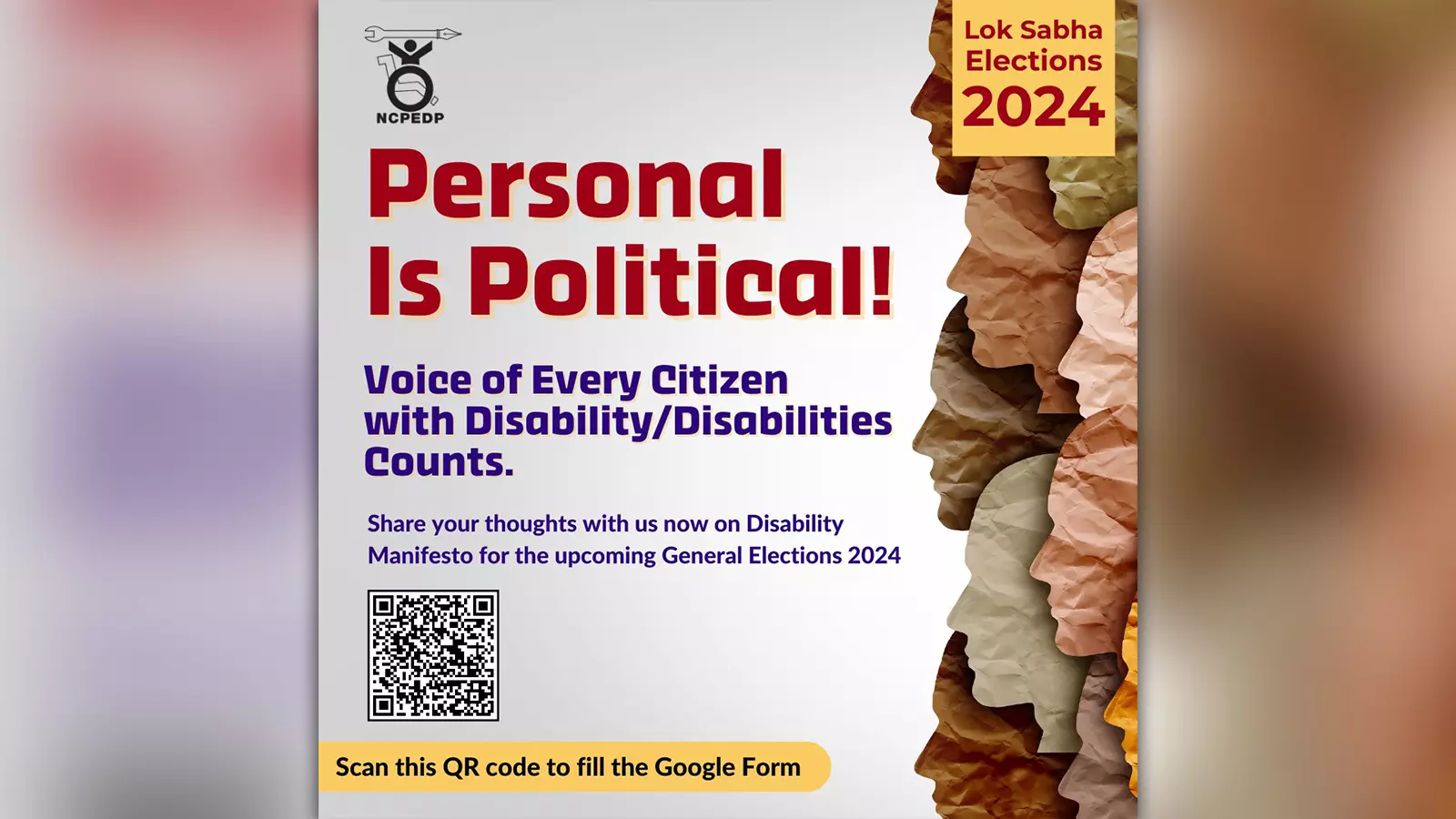
A poster seeking suggestions for the disability manifesto.
“A lot of persons with disabilities in rural and semi-urban areas are not enrolled in the voters' list. We don't know the exact numbers as there is no survey to reveal the data. Most of them live a life of invisibility because of poverty and lack of access to education, healthcare and transportation. These people need to be reached out by the authorities for elections to be a truly democratic process," she added.
A campaign to continue
After releasing the manifesto, disability rights groups are planning to send the document to every political party to incorporate their suggestions in their election promises. There will also be meetings to review the demands raised in the disability manifesto with politicians.

